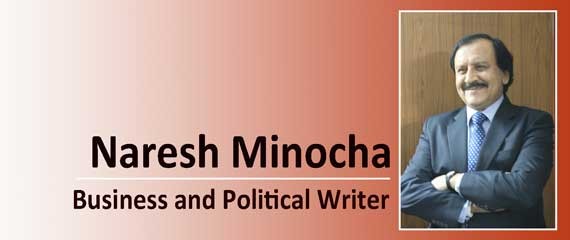What is new
Don’t Overlook Article 35A as J&K’s Chicken-or-Egg First Riddle
- Published on 04 November 2017
 (Jammu & Kashmir Tableau 26Jan2006 Image Courtesy: PIB)
(Jammu & Kashmir Tableau 26Jan2006 Image Courtesy: PIB)
“I am neither a Hindu, nor a Muslim nor any other, except that I am a man, a man with, common sense. As a man of common-sense, after perusing these agreements, what has been perplexing me is this whether Kashmir has acceded to India or India has acceded to Kashmir”.
That was late Surendra Mahanty participating in a Jammu& Kashmir (J&K) debate in Rajya Sabha on 5th August 1952. He described handling of Kashmir as “a story of bungling, a story of muddled-thinking”. Mahanty added: “I will not go into it, nor will I invoke the name of Mahatma Gandhi, the Father of the Nation, for defending, the indefensible.”
What perplexed Dr. Mahanty baffles more the man in the street as the saga has become extremely messy & bloody since then. The Might and Pride of India has been compromised by successively regimes that lack the political spine to call spade a spade – Kashmir problem is nothing but demographic blackmail of the rest of India.
And Modi Government has proved that it also lacks the spine by reviving the rotten idea of interlocution. It has used planned peace talks as an excuse to delay in hearing of the case against Article 35A, which is indefensible if we go by Parliament records.
Make Tax Certainty as the Workhorse of Global, Inclusive Growth
- Published on 02 November 2017
 Image Courtesy: pwc.com (Paying Taxes 2017 report)
Image Courtesy: pwc.com (Paying Taxes 2017 report)
Multilateral institutions’ (MIs’) periodic discourse on global fiscal reforms for sustained, inclusive economic growth is not resulting in concerted, collective action. One would arrive at this conclusion after going through documents released at the recently concluded International Monetary Fund (IMF)/World Bank (WB) annual meetings.
The unfortunate aspect of such MIs’ efforts is that only a fraction of the valuable recommendations contained in their reports get implemented. A case in point is a joint report by IMF and Organisation for Economic Co-operation and Development (OECD) on ‘Tax Certainty’ prepared in March 2017 for finance ministers of G20 countries.
There is hardly any concerted action by G20/OECD/IMF to make ‘Tax Certainty’ the mantra for sustained, inclusive growth of world economy. Certain countries such as the United States and India have, on the contrary, contributed to tax uncertainty.
The US is formulating a tax incentives package whose spillover impact on other countries can’t be predicted at present. India has messed up goods and service tax (GST) as symbol of botched implementation of intended good and simple tax.
Before elaborating on benefits of tax certainty, consider first the latest resolutions and suggestions. The International Monetary and Financial Committee (IMFC) has resolved that its member countries will strive to implement domestic policies that develop an adaptable and skilled workforce and enhance inclusion.
Pessimism Vs Optimism Discourse Shouldn’t Cloud Reality
- Published on 15 October 2017
 (Pessimism & allied woes listed by Narendra Modi as Gujarat CM. Image Courtesy: Modi's Speech 27th December 2012 )
(Pessimism & allied woes listed by Narendra Modi as Gujarat CM. Image Courtesy: Modi's Speech 27th December 2012 )
The Prime Minister Narendra Modi has stirred a national debate on Pessimism versus Optimism while defending his Government’s performance especially on the economic front.
Inaugurating Institute of Company Secretaries of India’s (ICSI’s) golden Jubilee Year Celebrations on 4th October, Mr. Modi said: “Some people take pleasure is spreading pessimism. They get a good sleep out of it. For them slowdown in GDP in one quarter is like a dose .There is a need to identify such people”.
To avid news readers, this might ring in a quote from External Affairs Minister Sushma Swaraj's sterling speech delivered last month at the United Nations.
Mrs Swaraj quipped: “Look who's talking!” while referring to Pakistan Prime Minister Shahid Khakan’s baseless allegation that India nurtured State-sponsored terrorism.
The ‘Look’ quote fits well on Modiji’s hat because he himself once excelled in creating tsunami of pessimism. He, in fact, owes his elevation from the stature of Gujarat Chief Minister to India’s PM to his success in spreading pessimism against UPA Government.
Economic Stimulus as Smokescreen for Crony Capitalism?
- Published on 01 October 2017
 (Image Courtesy: Youtube)
(Image Courtesy: Youtube)
“This government now realises that they need a boost of Viagra to do something about the economy. Now they want Rs 40,000-50,000 crore to inject into the economy. No nation can survive like this,” stated eminent lawyer-cum-Congress leader Kapil Sibal. He said so while mocking Modi Government’s loud thinking on economic stimulus.
Mr. Sibal is right because Viagra is addictive. It can hook the economy to ‘Yeh Dil Mange More’ mania. Recall UPA Government’s experience. It was forced to sustain the 2008 stimulus necessitated by the global meltdown for too long. It thus hit fiscal prudence for a six.
Risk to fiscal health aside, economic stimulus often serves as fig leaf for crony capitalism. The Government of the day readily succumbs to lobbying by influential companies and sectors. It ends up doling out tax incentives and makes additional expenditures to bail them out of their own cup of woes.
Prime Minister Narendra Modi should get an indepth study on post-budget stimuli given to one sector or the other by different regimes since the Independence. It would certainly be an eye-opener for all.
Is the talk of economic stimulus a ploy to bail out hand-picked sectors such as the influential telecom services providers that operate as elite clique called COAI?


